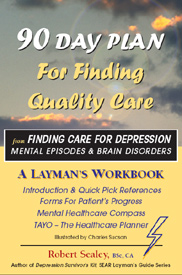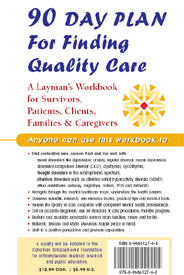90 Day Plan for Finding
Quality Care
A Laymanís Workbook for Patients, Families, Caregivers & Health Professionals
by Robert Sealey, BSc, CA
SEAR Publications, Toronto, ON, 2002
Paperback, 64 pages
$9.99 US, $13.99 Cdn


|
90 Day Plan for Finding Quality Care A Laymanís Workbook for Patients, Families, Caregivers & Health Professionals by Robert Sealey, BSc, CA SEAR Publications, Toronto, ON, 2002 Paperback, 64 pages $9.99 US, $13.99 Cdn |
 |  |
This workbook can help you navigate through the mental healthcare maze, find competent healthcare, and recover within 90 days.
Download 1/3 of the book for free. Get started on a 30 Day self-directed recovery plan.
Download (.pdf)
includes:
Table of Contents
Introduction
How to Use the 90 Day Plan + 10 Steps for Effective Mental Healthcare + Sample Worksheet
Exploring the Mental Healthcare Maze + Tools for Finding Quality Care
Instructions for people who want to see samples and use excerpts from the 90 Day plan for Finding Quality Care:
You are welcome to print the above excepts from the 90 Day Plan and use these
tools to guide your search for restorative mental healthcare. Feel free to
use the forms and discuss them with your family and your health pros:
--Month One of the 90 Day Plan for Finding Quality Care
10 Tools and How You Can Use Them
1. Map of the Mental Healthcare Maze
Where are you now? Where do you want to be 30 days from now?
2. Index to the 90 Day Plan
Explains how you can use the forms to find quality care.
3. Outine Past Health Problems
Note your patient and family medical and mental history.
4. Rate your Health Professionals
Are you getting R.A.I.S.E.? Or _______ ? What sort of care do you want?
5. Patient's Progress Report
You can summarize your healthcare choices and
plan your patient work for the next 30 days. With a good plan, you can find
care, you can recover and you can keep well.
6. Healthcare Reality Check
You can check out your progress.
7. Mental Healthcare Compass: In which direction are you heading? Where do
you want to go next? You can plan your search so you find proper care.
8. Visits with Health Professionals: You can make brief notes to document
your sessions, your progress, your problems, your recommendations and your
results.
9. ASTER Form
You can detail your assessments, your treatments, the effects
and your results. The more detail you can note, the more you can help yourself
find quality care.
10. TAYO - Think About Your Options - A Healthcare Planner
Is your care minimalist, conservative, restorative or _______? Are you cooperating
with your caregivers? Are they helping you to find effective care? Or, are
things going sideways or backwards? A patient can use TAYO to indicate his
or her position with respect to attitudes and efforts, symptoms and side
effects, diagnosis and treatments. A patient can discuss this with family
members, caregivers and health professionals. Indicate what is happening
with respect to your diagnosis and treatments. Use the planner to coordinate,
organize care and cooperate with your caregivers. You can show them your
TAYO form and you can ask for accurate diagnosis and restorative treatments.
After 30 days, you can start again with the forms for Month 2
11. Progress reports - month 2
12. Healthcare reality check - month 2
13. Mental healthcare compass - month 2
After 90 days, you will have a clear picture of your situation, with
back-up documentation which you can discuss with your family, caregivers
and health professionals.
If you are a sick patient, depressed and discouraged, feeling helpless and
hopeless, never quit on yourself. One day at a time, you can get better.
If you are a family member or a caregiver, never give up if a loved one
has a mental disorder. Restorative treatments are available.
If you are a frustrated health professional, never stop working on your patient.
Follow your practice guidelines which recommend accurate differential diagnosis
and effective restorative treatments.
After his interviews with 150 depression survivors brought to light coping concerns and common problems, Sealey developed tools for patients, family and caregivers. He offers a mental healthcare compass, practical tips, avoidable traps, checklists, worksheets and even a healthcare planner.
We expect a credible workbook from a writer whose Bachelor of Science degree included courses in biological and medical sciences and psychology. Still, we wonder what motivated Sealey. How did he find mental healthcare that is consistent with the practice guidelines of psychiatry and applies the life science of biochemistry restoratively for clinical purposes? What did he discover by probing the health system? Why did he decide to help patients find quality care?
Robert Sealey, BSc, CA works as an independent consultant in North York, Ontario, Canada. From the age of seventeen, Bob suffered prolonged episodes of depression. Eight health professionals failed to 'cure' him. After decades of misdiagnosis and mistreatment, medical incompetence and short cuts, Sealey wanted to restore his mental health. He kept trusting that it could be done. When a mood disorder 'expert' psychiatrist omitted thirteen standard of care procedures, Bob deteriorated. At the age of forty-six, determined to get well, Bob used his resilience and persistence to set up an Independent Depression Project, explore the mental healthcare maze and write the SEAR series of layman's guides. Finding Care For Depression, Mental Episodes and Brain Disorders is his latest work, a sequel to his Depression Survivor's Kit and Mental Healthcare References.
Bob encourages patients, family and caregivers to hope, learn, cooperate and benefit. He reminds us that many people have mental disorders. We all know some of these poor souls: silenced, stigmatized, marginalized and shunned as if they were lepers. They suffer with conditions like depression, bipolar disorder, schizophrenia, ADD, autism, OCD, anxiety, migraine, stroke and dementia.
By writing about mental healthcare in a direct and uncompromising manner, Sealey questions psychiatric minimalism. Noting that competent mental healthcare involves more than labelling and drugging sick people, he advocates for accurate diagnoses and effective treatments. His tips, tools, teaching tales and references educate readers about the practice guidelines of psychiatry, standard of care procedures and restorative orthomolecular medicine.
If you or someone you know lives with depression, mental episodes or a brain disorder, this book can help you find effective care. - A. Hoffer, M.D., Ph.D.
| News | Site Map |
Articles |
Publications |
Order Form |
Consulting |
Links |
Home |